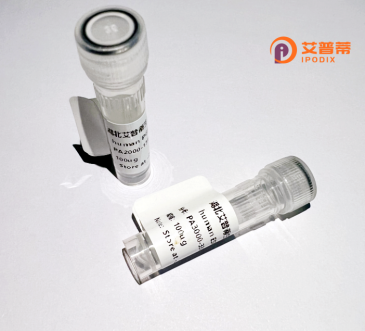
| 纯度 | >90%SDS-PAGE. |
| 种属 | Human |
| 靶点 | WISP3 |
| Uniprot No | O95389 |
| 内毒素 | < 0.01EU/μg |
| 表达宿主 | E.coli |
| 表达区间 | 24-354 aa |
| 活性数据 | TGPLDTT PEGRPGEVSD APQRKQFCHW PCKCPQQKPR CPPGVSLVRD GCGCCKICAK QPGEICNEAD LCDPHKGLYC DYSVDRPRYE TGVCAYLVAV GCEFNQVHYH NGQVFQPNPL FSCLCVSGAI GCTPLFIPKL AGSHCSGAKG GKKSDQSNCS LEPLLQQLST SYKTMPAYRN LPLIWKKKCL VQATKWTPCS RTCGMGISNR VTNENSNCEM RKEKRLCYIQ PCDSNILKTI KIPKGKTCQP TFQLSKAEKF VFSGCSSTQS YKPTFCGICL DKRCCIPNKS KMITIQFDCP NEGSFKWKML WITSCVCQRN CREPGDIFSE LKIL |
| 分子量 | 39.2 kDa |
| 蛋白标签 | His tag N-Terminus |
| 缓冲液 | PBS, pH7.4, containing 0.01% SKL, 1mM DTT, 5% Trehalose and Proclin300. |
| 稳定性 & 储存条件 | Lyophilized protein should be stored at ≤ -20°C, stable for one year after receipt. Reconstituted protein solution can be stored at 2-8°C for 2-7 days. Aliquots of reconstituted samples are stable at ≤ -20°C for 3 months. |
| 复溶 | Always centrifuge tubes before opening.Do not mix by vortex or pipetting. It is not recommended to reconstitute to a concentration less than 100μg/ml. Dissolve the lyophilized protein in distilled water. Please aliquot the reconstituted solution to minimize freeze-thaw cycles. |
以下为3篇关于重组人WISP3蛋白的文献概要:
---
1. **文献名称**:*WISP3 is a novel tumor suppressor gene of inflammatory breast cancer*
**作者**:Kleer CG 等
**摘要**:研究揭示了WISP3在炎性乳腺癌中作为肿瘤抑制基因的作用,发现重组WISP3蛋白通过抑制细胞侵袭和转移相关通路(如EGFR/β-catenin)抑制肿瘤进展。
---
2. **文献名称**:*Recombinant WISP3 suppresses proliferation and induces apoptosis in articular chondrocytes*
**作者**:Huang W 等
**摘要**:该研究利用重组WISP3蛋白处理关节软骨细胞,发现其通过调控TGF-β和MMP信号通路抑制细胞增殖并促进凋亡,提示WISP3可能在骨关节炎治疗中具有潜在价值。
---
3. **文献名称**:*Mutations in WISP3 are associated with progressive pseudorheumatoid dysplasia*
**作者**:Hurvitz JR 等
**摘要**:研究发现WISP3基因突变与进行性假性类风湿发育不良症(PPRD)相关,体外实验证实重组WISP3蛋白可恢复突变细胞的正常分化功能,表明其参与骨骼发育调控。
---
如需扩展,还可补充关于WISP3蛋白结构解析的研究文献。
WISP3 (Wnt1-inducible signaling pathway protein 3), also known as CCN6. is a member of the CCN family of matricellular proteins. These secreted cysteine-rich proteins regulate cell-matrix interactions, cellular communication, and tissue development. The human WISP3 gene is located on chromosome 6q21 and encodes a 367-amino acid protein containing four conserved domains: an insulin-like growth factor-binding domain, a von Willebrand factor type C module, a thrombospondin type 1 repeat, and a C-terminal cystine knot motif.
Biologically, WISP3 modulates Wnt/β-catenin signaling and interacts with integrins to influence chondrocyte proliferation, differentiation, and extracellular matrix homeostasis. Its mutation causes progressive pseudorheumatoid dysplasia (PPD), an autosomal recessive skeletal disorder characterized by cartilage loss. Aberrant WISP3 expression has been implicated in cancers, showing both tumor-suppressive and pro-metastatic activities depending on cellular context.
Recombinant human WISP3 protein is typically produced in mammalian expression systems (e.g., HEK293 cells) to ensure proper post-translational modifications. This engineered protein enables functional studies of WISP3-mediated pathways, investigation of PPD pathophysiology, and development of therapeutic strategies for skeletal disorders. Its applications extend to in vitro models of osteoarthritis, cancer biology research, and exploration of tissue repair mechanisms. Purified WISP3 often includes tags (e.g., Fc or His tags) for detection and isolation, with activity validated through receptor-binding assays and chondrocyte differentiation tests.
×